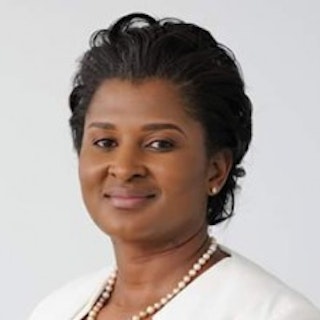Africa Rising: The Change that Should Happen
Africa is entering a transition: as the newest generation of citizens comes of age and grows in influence, leaders across the continent are faced with new expectations. As a first lady, Madame Geingos is embracing the youth movement while helping steer her country toward a new narrative.
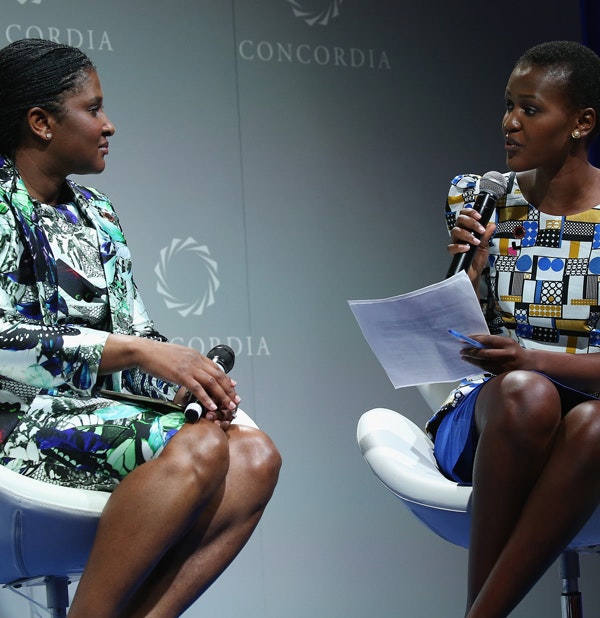 Madame Monica Geingos (left) and WaterAid America Youth Ambassador & SEED Project Partnerships Manager Vivian Onano speak at the 2016 Concordia Summit, September 20, 2016. (Paul Morigi / Getty Images)
Madame Monica Geingos (left) and WaterAid America Youth Ambassador & SEED Project Partnerships Manager Vivian Onano speak at the 2016 Concordia Summit, September 20, 2016. (Paul Morigi / Getty Images)
A business leader and gender advocate, Monica Geingos is focused on bridging economic and social divides across her country. Amid unprecedented growth and a youth boom, the First Lady of Namibia underscores the importance of effective leadership and collaboration as the continent looks to the future. In early April, the Bush Institute’s Natalie Gonnella-Platts and Brittney Bain interviewed Madame Geingos in her office in Windhoek, Namibia.
How has your personal journey influenced your work to empower young people and bridge economic divides in Namibia?
My personal and professional journeys were a bit of a trip, hop, and a skip. They started very young and, if I look back at some of the risks I faced, I would never have embarked on that route. Sometimes it’s good to not know certain risks. It makes you braver than you otherwise would have been. That has influenced me a lot.
There’s a lot of opportunity in what we fear. To find opportunity, find the risk, but also see what can be done within the risk.
That approach has influenced my decision to found the One Economy Foundation. Sometimes you have to deal with hard issues, not just the soft ones. You have to say things that not everybody will appreciate. But you’re not going to make any change as a leader if you’re not willing to spend social capital.
Risk-taking early in my personal and professional life has influenced a lot of the calculated risks I take now in my adult life.
There’s a lot of opportunity in what we fear. To find opportunity, find the risk, but also see what can be done within the risk.
Africa has the largest youth population in the world. How has your view of young people changed through your work in the Office of the First Lady and the One Economy Foundation?
Influence is happening both ways. Young people influenced me to rethink some of my perceptions and how we should package solutions for young people. And I do believe I influence them. When I tell them about my adolescent years, the first thing they say to me is “Wow, that’s exactly what I’m going through now.” The minute they realize their experience is very typical of their age, they become more receptive to different views and solutions.
Many of the young people we work with come from low-income households. In addition to normal teenage problems like low self-esteem, there are very real challenges, like every-day hunger and walking long distances to school. They live in a society where there’s a high level of gender-based violence, and many of them have experienced it both directly and indirectly. Life is tough as an adolescent and as an adult as well. You need to look past your challenges and focus on how you’re going to remove yourself from negative situations.
I think we influence each other.
What has surprised you most about your role as first lady?
What has surprised me is how complex it can be. You are in a constant balancing act in terms of what you can do and say. It is not just dealing with the interpretation of the media, the government, and the private sector. It also is dealing with how your own views evolve.
What is surprising as first lady is that I have a better understanding of how government works, and what I see is a much more orderly process than what I saw when I was in the private sector.
Often from the outside looking in, you look at a decision and say, “That’s crazy, how did they come to this?” But I’ve started to gain a deeper level of respect and understanding for the complexity of government and the complexity it presents to people who have to drive those decisions. And all the different challenges that you need to overcome to be effective.
Often from the outside looking in, you look at a decision and say, “That’s crazy, how did they come to this?” But I’ve started to gain a deeper level of respect and understanding for the complexity of government and the complexity it presents to people who have to drive those decisions.
Why does women’s leadership matter?
One thing we see is a very subtle pushback on women’s empowerment from men. It’s possible that is because of the way the issue has been shaped; that in order for a woman to be empowered, men have to be disempowered.
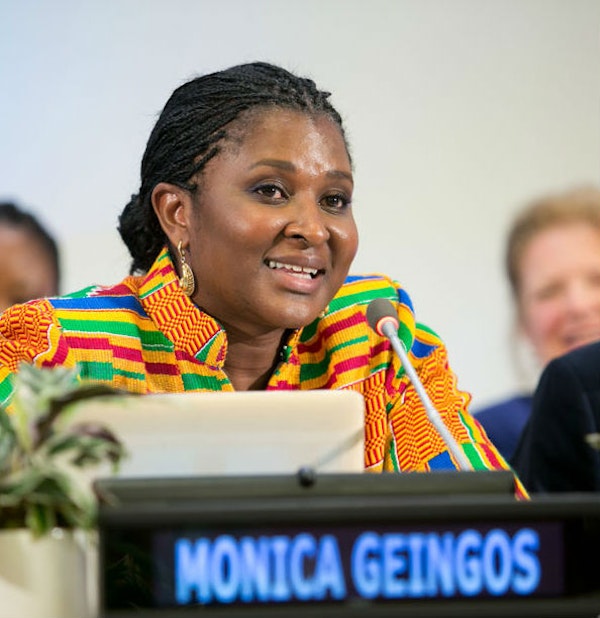 Madame Monica Geingos at the UNAIDS and PEPFAR annoucement. A 60% decline in new HIV infections among children has been reported since 2009 in the 21 countries in sub-Saharan Africa that have been most affected. (UNAIDS)
Madame Monica Geingos at the UNAIDS and PEPFAR annoucement. A 60% decline in new HIV infections among children has been reported since 2009 in the 21 countries in sub-Saharan Africa that have been most affected. (UNAIDS)
That’s a fundamental misunderstanding and that’s why my approach is not from the angle of women’s leadership. It’s more from the perspective of inclusivity. You cannot exclude half of your population, or a significant part of that half, and expect to perform at capacity. You cannot exclude half of your brains, half of your talent, half of your friends – it doesn’t make sense. And you have to rectify it.
You cannot exclude half of your population, or a significant part of that half, and expect to perform at capacity. You cannot exclude half of your brains, half of your talent, half of your friends – it doesn’t make sense.
Why has inclusivity been important to you, either as first lady or through your role as the UNAIDS Special Advocate for Women and Adolescent Girls?
When we speak about integrating the first and the second economies, it’s never going to be a clinical, clean process. It is going to be messy. And it’s going to be messier if people from the first economy want to dictate the solutions to people in the second economy.
You have to approach the issue from the ground level. That’s what we’ve managed to do by including individuals from a variety of backgrounds on the One Economy Foundation board, for example. They add value, perspectives, and you can bounce ideas off them. Their presence also has a psychological influence. It almost forces humility, where you must say to yourself, “If we are discussing this at board level, and a member doesn’t understand this, how will this solution be understood on the group?”
What larger challenges do you see across the continent? Why is now a critical time for Africa?
This is an important discussion because all societies are dealing with inequality. For a society that went through colonialism, and that’s most African countries, these governments inherited entrenched inequality.
Without focused interventions, you simply are not going to change it. You can reduce poverty but the inequality stays the same or gets worse. To the extent that inequality is reduced, it’s at a very nominal level. And the inequality that you find in Africa is quite extreme. It is normally structured on ethnic, religious, cultural, or racial fault lines.
That fault line is dangerous. The day that something erupts, it becomes more than just an inequality issue. It becomes actual strife. It becomes actual conflict, and trying to rebuild anything in the absence of peace is almost impossible.
This is an urgent challenge given Africa’s high youth population. And it comes down to the basics of hope. If you have a lot of young people in your country who have no hope, who feel they have nothing to lose, they’ve got two options: To escape your country and try and look for brighter lights, which they see overseas, and that becomes your problem. Or they have the option of simply not caring whether the societies they live in are peaceful, and potentially driving social conflict because of their frustration.
The only way you can curtail those outcomes is to translate their hope into domestic opportunity. And that’s really the crux of what we’re trying to do through the One Economy Foundation. If you want to look for better opportunity because it’s available somewhere else, and you have the skills, that’s no problem. But if the push factor is really “I’ve got no other choice,” then it is a much bigger problem than a domestic issue.
Developed countries are seeing that consequence. We’ve got young people leaving on boats, trying to escape the continent and that is a reflection not only on us, but also on the way that the global world order is structured.
That fault line is dangerous. The day that something erupts, it becomes more than just an inequality issue. It becomes actual strife. It becomes actual conflict, and trying to rebuild anything in the absence of peace is almost impossible.
Gender-based violence is an area of particular focus for you. Why is this an important issue to tackle in addressing poverty in Namibia and beyond?
It’s a cycle – a generational cycle. I can’t speak for other countries, but Namibia has moved on from our colonial and apartheid past but the impact of this history is still very visible.
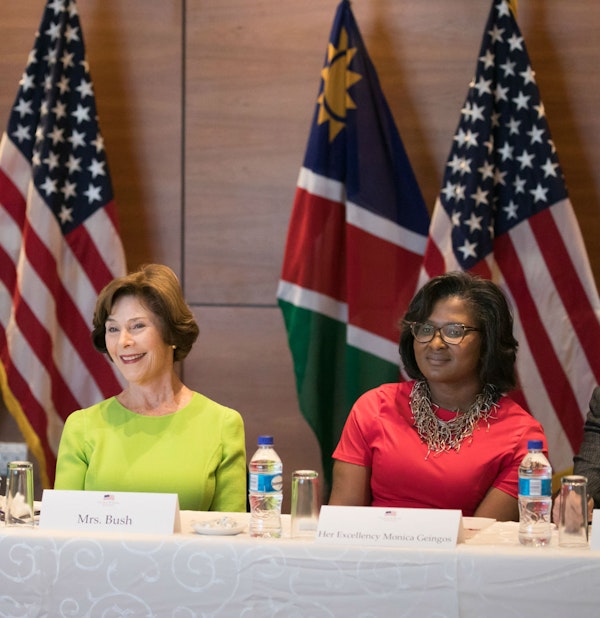 Mrs. Bush and Madame Geingos discuss the importance of investments in women and girls, April 6, 2017 in Windhoek, Namibia. (Paul Morse/George W. Bush Presidential Center)
Mrs. Bush and Madame Geingos discuss the importance of investments in women and girls, April 6, 2017 in Windhoek, Namibia. (Paul Morse/George W. Bush Presidential Center)
Migrant labor systems, for instance, decimated our families, and child-headed households are common. Single mothers who are raising their children in the absence of their children’s fathers is very common. And you see high levels of alcohol abuse, sometimes concentrated in specific communities that feed the jails.
Coordinated intervention needs to happen at the source, which is the family structure. If we don’t strengthen the fabric that holds families together, we’ll continue incarcerating our young.
What gives you hope for the future for Namibia and across Africa?
I have really bought into the “Africa Rising” narrative. The Africa that you used to read about, and the stereotypes we’ve become associated with, is different from the Africa that we know. The Africa that we know is still not perfect. The Africa we know still makes itself guilty of certain stereotypes. But the Africa that we know is also developing at a much faster rate than it ever has.
There is stronger leadership. And the Africa that we currently know has a youth population that is keeping leadership accountable. They have higher expectations for themselves and they demand accountability. If you don’t demand certain things you don’t get them and young people are pushing. It may not be appreciated all the time, but they are definitely pushing the kind of change that should happen.
What gives me hope is that young Namibians are confident and that is true of most African youth. They are still hopeful. The fact they still have hope despite their circumstances says to me that we have hope. As long as they have hope, and as long as we are committed to translating their dreams, the continent has hope.
I have really bought into the “Africa Rising” narrative. The Africa that you used to read about, and the stereotypes we’ve become associated with, is different from the Africa that we know.
What would you want the rest of the world to know about Namibia?
The fact that the world doesn’t know Namibia is exactly because we’re doing things the right way. If there was war, conflict, and all kinds of bad things, the world would know about us. I have no problem with Namibia being unknown because it means things are working.
But if there is something I could share, it is that there are countries that are doing exceptionally well through their own conviction and when they get external aid that translates into positive growth. There are countries that really are doing as much as they can and the foreign assistance that comes on top of that really does translate into effective outcomes.
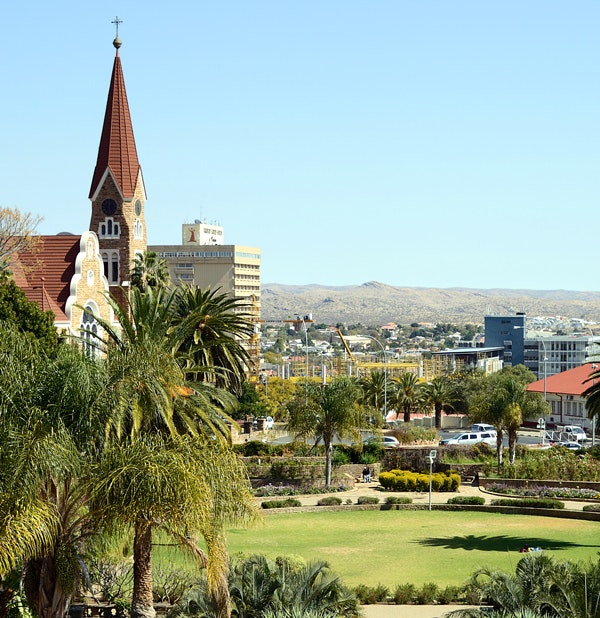 Windhoek, Namibia (Shutterstock)
Windhoek, Namibia (Shutterstock)
Namibia is one of those countries. We’re a great example of what a collaboration looks like. Both parties can see the results of one another’s participation.
There’s a much bigger sense of urgency now to deliver the social economic outcomes that our people expect. The push factor may be a society generally that is less tolerant of wastefulness, of corruption, of inefficiency.
There’s a much bigger awareness in new leaders. For example, in Namibia we’ve had three presidents, and with each new administration there’s a new realization that we can do this differently. New attitudes of accepting new ways of doing things is driving a lot of change.
With my husband, for instance, the first thing he did when he came in as president was to declare his assets. He declared the full details of his assets, how many bank accounts he had, what was in it, how much cattle he has, what his debt obligations are, whether it’s in relation to mortgages, car payments, whatever it is, he disclosed everything. He also disclosed his health status. And then he disclosed my assets as well, in the same detail he disclosed his own.
The reason he did that, and he’s under no legal obligation to do so, and I definitely am not, was to manage stereotypes that have been perpetuated of African leaders and to set an example to other political leaders in the country. The only way we can manage stereotypes is to be accountable, to be transparent, and we must accept that somebody’s going to ask a question. We live in a society that demands transparency, that demands answers, and as leaders we must be prepared to give those answers.
The only way [African leaders] can manage stereotypes is to be accountable, to be transparent, and we must accept that somebody’s going to ask a question. We live in a society that demands transparency, that demands answers, and as leaders we must be prepared to give those answers.
Do you see Namibia’s example influencing others?
We are succeeding, but it is difficult to claim credit for it as Namibia. There is a continental view on accountability. The African Union deserves some credit as well. What they are saying around governance, human rights, managing inequality, inclusivity, women’s empowerment, health outcomes etc. is exactly what Namibia is saying.
The leaders are starting to influence one another, and that’s allowing us to start looking at an African model of leadership. The African way of dealing with one another is different from the Western way. For the first time, as a continent, we are subscribing to corporate governance as we understand it, and as our societies understand it.
As much as we respect that you in the West have your way of doing things, we need some respect for the different way that we do and understand things, all with the same outcome of ensuring accountable, transparent, and effective leadership.
Many people outside of the continent have a narrow and outdated view of Africa. Why is it important to change that narrative?
One thing we’re very good at is selling misery. We end up only focusing on the stories of misery in relation to Africa, and yet there are exceptional success stories. It’s as if there’s a perception that all Africans want to leave the continent.
That’s not true. Many of us want to stay right here. We love our countries. We don’t even consider leaving. We are happy with our lives. The same way you feel about your country, we feel about ours. And that’s the Africa that needs to be portrayed more; the view that we are proud of this continent, that one does find opportunity. And not through any connection or finances that were siphoned off from state resources or because you are the child of a politician. Just ordinary Africans, with no connections, making a dignified and decent life for themselves. And there are many of those Africans.
The same way you feel about your country, we feel about ours. And that’s the Africa that needs to be portrayed more; the view that we are proud of this continent, that one does find opportunity.
Building on Pan-African influence, are there ways in which other countries or other examples in Africa have influenced you and your work within Namibia?
The strong sense of sisterhood that exists in the Organization of African First Ladies Against HIV/AIDS (OAFLA) has changed my view of the African Union. It’s not really about what happens in the meetings. It has to do with the fraternal relations that come as a consequence of the meetings. You start understanding issues in other African countries a bit better. You start paying more attention. You understand the complexity more as you understand the leadership.
OAFLA has been great for me as a new first lady. It has provided a group of peers who are so giving of their time and what they’ve learned to make sure I don’t make the same mistakes. That’s a great example, and it’s an example I’ve implemented here with the First Lady’s Advisory Council.
The former first lady, Madame Penehupifo Pohamba, continues to have an exceptionally powerful voice, especially in relation to health issues. We also have a diverse group of people on the council: a youth representative, an HIV activist, somebody who’s involved in work around cancer, a woman who runs an orphanage in the northwest of the country.
That makes for a rich drawing board of ideas. This has taught me to extend the net when it comes to sourcing ideas and checking whether we are on the right track or not.
The Catalyst believes that ideas matter. We aim to stimulate debate on the most important issues of the day, featuring a range of arguments that are constructive, high-minded, and share our core values of freedom, opportunity, accountability, and compassion. To that end, we seek out ideas that may challenge us, and the authors’ views presented here are their own; The Catalyst does not endorse any particular policy, politician, or party.


